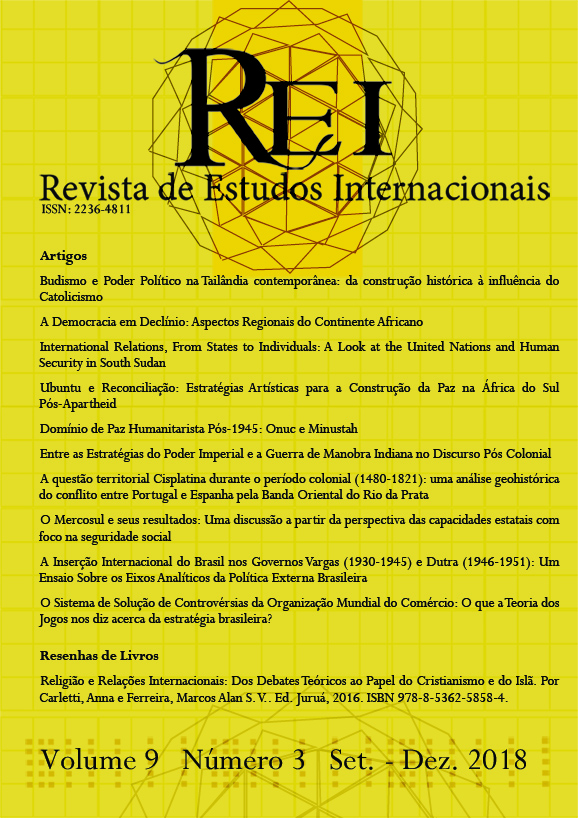DOMÍNIO DE PAZ HUMANITARISTA PÓS-1945: MINUSTAH e ONUC
Palavras-chave:
Paz Humanitarista, Operações de Paz, MINUSTAH, ONUC, Etnografia de DocumentosResumo
O referente artigo tem como pretensão fazer uma análise do domínio de paz humanitarista pós1945, que se diferencia do domínio de paz de Westfalia e apresenta novos enunciados e práticas políticas. Para tanto, utilizaremos como orientação metodológica a “etnografia de documentos” com intuito de analisar discursos e práticas políticas evidentes nas operações de paz da Missão das Nações Unidas para a Estabilização do Haiti (MINUSTAH) e da Organização das Nações Unidas no Congo (ONUC), avaliando se elas se enquadram nesse domínio de paz contemporâneo pós-1945. Com isso, buscaremos demonstrar o
funcionamento de um novo discurso ontológico sobre a paz que se sustenta juntamente com dispositivos diplomático-policiais (biopoder, poder disciplinar e poder pastoral), redefinindo as práticas humanitárias e normalizando mecanismos de intervenção voltados para a gestão de vidas precárias à nível global.
Referências
GALTUNG, Johan (1969). Violence, Peace and Peace Research. Journal of Peace
Research, 6 (3):167-91.
____. (1996) Peace by Peaceful Means. London (UK): SAGE.
GOLDER, Ben; FITZPATRICK, Peter (2011). Foucault´s Law. London (UK): RoutledgeCavendish.
JABRI, Vivienne (2010). War, Government and Politics: a critical response to the hegemony of the
liberal peace. In RICHMOND, Oliver P. Palgrave Advances in Peacebuilding: critical
developments and approaches. New York: Palgrave Macmillan.
JACOBSON, H. (1964). ONUC’s Civilian Operations: State-preserving and State-building. World
Politics, 17 (1): 75-107.
KIRDAR, U. (1966). The structure of the United Nations Economic-Aid to Underdeveloped
Countries. Holanda: Springer Science Business Media.
HURD, Elizabeth Shakman. (2011) Secularism and International Relations Theory. In: SNYDER,
Jack. Religion and International Relations Theory. New York: Columbia University Press.
LOWENKRON, Laura & FERREIRA, Letícia (2014). Anthropological perspectives on documents:
ethnographic dialogues on the trail of police papers. Vibrant, 11 (2): 75-111.
Luiz Inácio Lula da Silva (LULA). (2004). Discurso do Presidente da República, Luiz Inácio
Lula da Silva, perante a Brigada Brasil da Missão das Nações Unidas para o Haiti. Porto
Príncipe, Haiti. Publicado em[http://www.mundorama.net/2004/08/18/discurso-do-presidente-darepublica-luiz-inacio-lula-da-silva-perante-a-brigada-brasil-da-missao-das-nacoes-unidas-para-ohaiti-porto-principe-haiti-18082004/]. Disponibilidade: 03/03/ 2016.
MAC GINTY, Roger; PETERSON, Jenny (2015). The Routledge Companion to Humanitarian
Action. New York: Routledge.
MANJI, Firoze; O’Coill, Carl (2002). The Missionary Position: NGOs and Development in Africa.
International Affairs, 78 (3): 567-83.
MERLINGEN, Michael; OSTRAUSKAITE, Rasa (2005). Power/Knowledge in International
Peacebuilding: the case of the EU Police mission in Bosnia. Alternatives (30): 297-323.
NEOCLEOUS, Mark (2000). The Fabrication of Social Order: a critical theory of police power.
Archway Road: Pluto Press.
NGO MAP (Haiti). (2016). Developing Citizenship in Martissant through FOKAL, publicado
em[https://haiti.ngoaidmap.org/projects/17980]. Disponibilidade: 06/072016.
Organização das Nações Unidas (ONU). (1960a). Security Council Resolution 145, publicado em.
[https://documents-ddsny.un.org/doc/RESOLUTION/GEN/NR0/157/35/IMG/NR015735.pdf?OpenElement].
Disponibilidade: 07/07/ 2016.
______. (1960b). Public Papers of the Secretaries General of the United Nations, Volume 5:
-1961. Nova York: Columbia University.
______. (1961a) Security Council Resolution 161, publicado em [https://documents-ddsny.un.org/doc/RESOLUTION/GEN/NR0/171/68/IMG/NR017168.pdf?OpenElement].
Disponibilidade: 07/07/ 2016.
______. (1961b). Security Council Resolution 169, publicado em [https://documents-ddsny.un.org/doc/RESOLUTION/GEN/NR0/171/76/IMG/NR017176.pdf?OpenElement].
Disponibilidade: 07/07 2016.
______. (2004a). Security Council Resolution 1542, publicado em
[http://www.un.org/en/ga/search/view_doc.asp?symbol=S/RES/1542%282004%29].
Disponibilidade: 03/07/ 2016.
______. (2004b). Report of the Secretary-General on the United Nations Stabilization Mission
in Haiti. S/2004/300, publicado em
[http://www.un.org/en/ga/search/view_doc.asp?symbol=S/2004/300]. Disponibilidade: 05/05/ 2016.
______. (2006). Report of the Secretary-General on the United Nations Stabilization Mission
in Haiti. S/2006/60, publicado
em[http://www.un.org/en/ga/search/view_doc.asp?symbol=S/2006/60]. Disponibilidade: 05/05/
______. (2008). Report of the Secretary-General on the United Nations Stabilization Mission
in Haiti. S/2008/202, publicado
em[http://www.un.org/en/ga/search/view_doc.asp?symbol=S/2008/202]. Disponibilidade: 05/07/
______. (2009). Report of the Secretary-General on the United Nations Stabilization Mission
in Haiti. S/2009/129, publicado
em[http://www.un.org/en/ga/search/view_doc.asp?symbol=S/2009/129]. Disponibilidade: 04/07/
______. (2012). Report of the Secretary-General on the United Nations Stabilization Mission
in Haiti. S/2012/128, publicado em
[http://www.un.org/en/ga/search/view_doc.asp?symbol=S/2012/128]. Disponibilidade: 06/07/ 2016.
______. (2016). Haiti Background, publicado em
[http://www.un.org/en/peacekeeping/missions/past/unmihbackgr2.html]. Disponibilidade:
/07/2016.
POCOCK, J. G. A. (1995). Virtue, Commerce, and History. Cambridge: Cambridge University
Press.
PUREZA, José Manuel (2006). Three Deconstructions. In PUREZA, José Manuel; DUFFIELD,
Mark; MATTHEWS, Robert; SOGGE, David. Peacebuilding and Failed States: some theoretical
notes. New York: Peace Studies Group (Experts Meeting) – Ford Foundation.
RABINOW, Paul; DREYFUS, Hubert (1995). Michel Foucault: uma Trajetória Filosófica. Rio
de Janeiro: Forense Universitária.
RED CROSS. (1963). Centenary Year of the Red Cross 1963. International Review of the Red
Cross, Third Year, (23). Publicado em[https://www.loc.gov/rr/frd/Military_Law/pdf/RC_Feb1963.pdf]. Disponibilidade: 07/07/ 2016.
______. (2016). Become a Volunteer. Publicado em [http://www.redcross.org/volunteer/becomea-volunteer#step1]. Disponibilidade: 05/07 2016.RICHMOND, Oliver P. (2008). Peace in
International Relations. New York: Routledge, Taylor & Francis Group.
RILES, Annelise (2006). Documents: artifacts of modern knowledge. Ann Arbor: University of
Michigan Press.
RODRIGUES, Thiago (2013). Ecopolítica e Segurança: a Emergência do dispositivo diplomático
policial. Revista Ecopolítica, 5: 115-56.
ROSENAU, James N. (1990). Turbulence in World Politics: a theory of change and continuity.
Princeton: Princeton University Press.
SENELLART, Michel. (2006). As artes de governar: do regime medieval ao conceito de governo.
São Paulo: Editora 34.
SHAKUR, Assata. (2016). Collected Speeches and Writings of Patrice Lumumba, publicado
em[http://www.assatashakur.org/forum/shoulders-our-freedom-fighters/42970-collected-speecheswritings-patrice-lumumba.html]. Disponibilidade: 06/07/ 2016.
SHANKAR, K.; HAKKEN, D. (2014). The Ethnography of Documents in STS Scholarship.
Workshop on Ethnography of Documents Handbook Summit, publicado
em[http://disi.unitn.it/~dandrea/workshop/2014/2nd%20Workshop%20on%20the%20ethnography
%20of%20documents/handbook_submit.pdf]. Disponibilidade: 28/03/ 2018.
SPOONER, Kevin A. (2009). Canada, the Congo Crisis, and UN Peacekeeping, 1960-64.
Vancouver: UBC Press.
UNITED NATIONS. (1961). Yearbook of the United Nations 1961. New York: Office of the
Public Information – United Nations.
______. (1963). Yearbook of the United Nations 1963. New York: Office of the Public
Information – United Nations.
______ Commission on Human Security (UNCHS). (2003). Human security now: final report.
New York: CHS.
______. (2016). Security Sector Reform, publicado em
[http://www.un.org/en/peacekeeping/issues/security.shtml]. Disponibilidade: 02/07 2016.
UN POLICE (UNPOL). (2013). UN Police Magazine. United Nations Department of Peacekeeping
Operations, publicado em
[http://www.un.org/en/peacekeeping/publications/unpolmag/unpolmag_11.pdf]. Disponibilidade:
/05/2016.
WEST, Robert (1961). The United Nations and the Congo Financial Crisis: lessons of the First
Year. International Organization,15 (4): 603-17.


